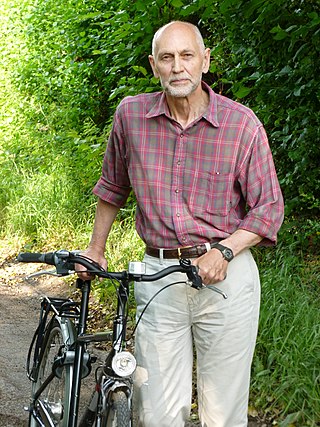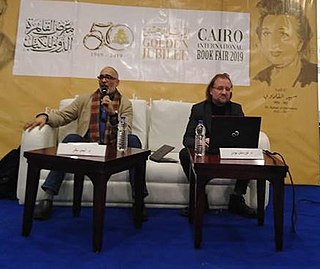Related Research Articles

Aesthetics is the branch of philosophy concerned with the nature of beauty and the nature of taste; and functions as the philosophy of art. Aesthetics examines the philosophy of aesthetic value, which is determined by critical judgements of artistic taste; thus, the function of aesthetics is the "critical reflection on art, culture and nature".

The mind is that which thinks, imagines, remembers, wills, and senses, or is the set of faculties responsible for such phenomena. The mind is also associated with experiencing perception, pleasure and pain, belief, desire, intention, and emotion. The mind can include conscious and non-conscious states as well as sensory and non-sensory experiences.
Neutral monism is an umbrella term for a class of metaphysical theories in the philosophy of mind, concerning the relation of mind to matter. These theories take the fundamental nature of reality to be neither mental nor physical; in other words it is "neutral".
Experience refers to conscious events in general, more specifically to perceptions, or to the practical knowledge and familiarity that is produced by these processes. Understood as a conscious event in the widest sense, experience involves a subject to which various items are presented. In this sense, seeing a yellow bird on a branch presents the subject with the objects "bird" and "branch", the relation between them and the property "yellow". Unreal items may be included as well, which happens when experiencing hallucinations or dreams. When understood in a more restricted sense, only sensory consciousness counts as experience. In this sense, experience is usually identified with perception and contrasted with other types of conscious events, like thinking or imagining. In a slightly different sense, experience refers not to the conscious events themselves but to the practical knowledge and familiarity they produce. In this sense, it is important that direct perceptual contact with the external world is the source of knowledge. So an experienced hiker is someone who actually lived through many hikes, not someone who merely read many books about hiking. This is associated both with recurrent past acquaintance and the abilities learned through them.

Gregory Paul Currie FAHA is a British philosopher and academic, known for his work on philosophical aesthetics and the philosophy of mind. Currie is Professor of Philosophy at the University of York and Executive Editor of Mind & Language.
A mental state, or a mental property, is a state of mind of a person. Mental states comprise a diverse class, including perception, pain/pleasure experience, belief, desire, intention, emotion, and memory. There is controversy concerning the exact definition of the term. According to epistemic approaches, the essential mark of mental states is that their subject has privileged epistemic access while others can only infer their existence from outward signs. Consciousness-based approaches hold that all mental states are either conscious themselves or stand in the right relation to conscious states. Intentionality-based approaches, on the other hand, see the power of minds to refer to objects and represent the world as the mark of the mental. According to functionalist approaches, mental states are defined in terms of their role in the causal network independent of their intrinsic properties. Some philosophers deny all the aforementioned approaches by holding that the term "mental" refers to a cluster of loosely related ideas without an underlying unifying feature shared by all. Various overlapping classifications of mental states have been proposed. Important distinctions group mental phenomena together according to whether they are sensory, propositional, intentional, conscious or occurrent. Sensory states involve sense impressions like visual perceptions or bodily pains. Propositional attitudes, like beliefs and desires, are relations a subject has to a proposition. The characteristic of intentional states is that they refer to or are about objects or states of affairs. Conscious states are part of the phenomenal experience while occurrent states are causally efficacious within the owner's mind, with or without consciousness. An influential classification of mental states is due to Franz Brentano, who argues that there are only three basic kinds: presentations, judgments, and phenomena of love and hate.
Depiction is reference conveyed through pictures. A picture refers to its object through a non-linguistic two-dimensional scheme, and is distinct from writing or notation. A depictive two-dimensional scheme is called a picture plane and may be constructed according to descriptive geometry, where they are usually divided between projections and perspectives.

Quassim Cassam, is professor of philosophy at the University of Warwick. He writes on self-knowledge, perception, epistemic vices and topics in Kantian epistemology. As blurbed for his book, Vices of the Mind (2019), Cassam defines epistemic vice as "character traits, attitudes or thinking styles that prevent us from gaining, keeping or sharing knowledge".
Peter Goldie was a British businessman and then academic philosopher with interests in ethics and aesthetics. He was the Samuel Hall Chair in Philosophy and Head of the Philosophy Discipline Area of the School of Social Sciences at University of Manchester. He was educated at Felsted.
Richard Shusterman is an American pragmatist philosopher. Known for his contributions to philosophical aesthetics and the emerging field of somaesthetics, currently he is the Dorothy F. Schmidt Eminent Scholar in the Humanities and Professor of Philosophy at Florida Atlantic University.
Jerrold Levinson is distinguished university professor of philosophy at the University of Maryland, College Park. He is particularly noted for his work on the aesthetics of music, as well as for his search for meaning and ontology in film, art and humour.

Shaun Nichols is an American professor of philosophy at Cornell University specializing in the philosophy of cognitive sciences, moral psychology and philosophy of mind.
Elisabeth Schellekens is a Swedish philosopher and Chair Professor of Aesthetics at Uppsala University. Previously, she was Senior Lecturer at Durham University (2006-2014). Schellekens is known for her works in aesthetics. Her research interests include aesthetic cognitivism and objectivism, aesthetic normativity, Hume, Kant, aesthetic and moral properties, conceptual art, non-perceptual or intelligible aesthetic value, the relations between perception and knowledge, the aesthetics and ethics of cultural heritage, and the interaction between aesthetic, moral, cognitive and historical value in art.

Berit Oskar Brogaard is a Danish–American philosopher specializing in the areas of cognitive neuroscience, philosophy of mind, and philosophy of language. Her recent work concerns synesthesia, savant syndrome, blindsight and perceptual reports. She is professor of philosophy and runs a perception lab at the University of Miami in Coral Gables, Florida. She was also co-editor of the Philosophical Gourmet Report until 2021.

Thorsten Botz-Bornstein is a German philosopher and writer specializing in aesthetics and intercultural philosophy. He is professor of philosophy at the Gulf University for Science and Technology in Kuwait and director of the Global Studie Center.

Edward S. Casey is an American philosopher and university professor. He has published several volumes on phenomenology, philosophical psychology, and the philosophy of space and place. His work is widely cited in contemporary continental philosophy. He is currently Distinguished Professor of Philosophy at Stony Brook University in New York and distinguished visiting faculty at Pacifica Graduate Institute.
John Hyman is a British philosopher. He was Professor of Aesthetics at the University of Oxford before being appointed as Grote Professor of the Philosophy of Mind and Logic at University College London in September 2018.
John Heil is an American philosopher, known primarily for his work on metaphysics and the philosophy of mind. Heil is Professor of Philosophy at the Washington University in St. Louis, Professor of Philosophy at Durham University, and an Honorary Research Associate at Monash University. Heil is the inaugural editor-in-chief of the Journal of the American Philosophical Association, the North American Representative of The Philosophical Quarterly, and a 2018 Guggenheim Fellow. He is the author of seven books and over 100 articles and book chapters.
Casey O'Callaghan is an American philosopher and Professor of Philosophy and Philosophy-Neuroscience-Psychology at Washington University in St. Louis. He is known for his works on philosophy of perception.
References
- ↑ "University Research Fund (BOF)". University of Antwerp. Retrieved 2012-11-20.
- ↑ "Bence Nanay". London Aesthetics Forum. 2011-02-16. Retrieved 2012-03-10.
- ↑ "Leiter Reports: A Philosophy Blog: Nanay from Syracuse to Antwerp". Leiterreports.typepad.com. 2010-06-28. Retrieved 2012-03-10.
- ↑ "Frontiers | Bence Nanay | Activity". Frontiersin.org. Retrieved 2012-03-10.
- ↑ "Fellows by Subject | Peterhouse". Pet.cam.ac.uk. Archived from the original on 2012-03-21. Retrieved 2012-03-10.
- ↑ "Professors".
- ↑ "Publications [#201166] of Karen L Neander". Fds.duke.edu. Retrieved 2012-03-10.
- ↑ Ganson, Todd; Bronner, Ben (2013). "Philosophical Studies, Online First™". Philosophical Studies. 164 (2): 405–418. doi:10.1007/s11098-012-9853-3. S2CID 170600011.
- ↑ Michael Tye (2009-12-16). "Up close with the speckled hen". Analysis. 70 (2): 283–286. doi: 10.1093/analys/anp169 .
- ↑ Briscoe, Robert Eamon (2011-05-11). "Mental Imagery and the Varieties of Amodal Perception". Pacific Philosophical Quarterly. 92 (2): 153–173. doi:10.1111/j.1468-0114.2011.01393.x.
- ↑ "Download Attachment" (PDF). 4092643945156239022-a-1802744773732722657-s-sites.googlegroups.com. Retrieved 2012-03-10.[ permanent dead link ]
- ↑ The Journal of Mind and Behavior. "The Journal of Mind and Behavior". Umaine.edu. Archived from the original on 2012-08-05. Retrieved 2012-03-10.
- ↑ Stegmann, Ulrich (2010-10-28). "Reply to Bence Nanay's 'Natural selection and the limited nature of environmental resources'". Studies in History and Philosophy of Science Part C: Studies in History and Philosophy of Biological and Biomedical Sciences. 41 (4): 420–421. doi:10.1016/j.shpsc.2010.10.008. PMID 21112017.
- ↑ Cavedon-Taylor, Dan (2011-11-17). "Taylor & Francis Online :: Seeing and retinal stability: On a sensorimotor argument for the necessity of eye movement for sight". Philosophical Psychology. 26 (2): 263–266. doi:10.1080/09515089.2011.633699. S2CID 143781224.
- ↑ "Leiter Reports: A Philosophy Blog: Philosopher Nanay Wins One Million Euro "Odysseus Grant" from the Flemish Research Foundation". Leiterreports.typepad.com. 2011-08-01. Retrieved 2012-03-10.
- ↑ "Fonds Wetenschappelijk Onderzoek - Vlaanderen: Odysseusprogramma huidige - detail" (in Dutch). Fwo.be. Archived from the original on 2012-09-03. Retrieved 2012-03-10.
- ↑ "ERC Consolidator Grants 2016: List of Principal Investigators – All domains" (PDF). European Research Council. 2016-12-07. Retrieved 2022-06-16.
- ↑ "The Monist: Calls For Papers". Monist.buffalo.edu. Retrieved 2012-03-10.
- ↑ "Symposia". Temple.edu. Archived from the original on 2012-02-02. Retrieved 2012-03-10.
- ↑ "How cinema lost its soul - Features - Films". The Independent. 2007-01-17. Retrieved 2012-03-10.
- ↑ "Film Festivals . com - People". Filmfestivals.com. Archived from the original on 2008-06-10. Retrieved 2012-03-10.
- ↑ "Awards - 2004". Fipresci. Archived from the original on 2012-01-06. Retrieved 2012-03-10.
- ↑ "Awards 2007". Fipresci. Archived from the original on 2010-11-22. Retrieved 2012-03-10.
- ↑ "Oxford University Press: Perceiving the World: Bence Nanay". Oup.com. Archived from the original on 2012-01-19. Retrieved 2012-03-10.
- ↑ Between Perception and Action. Oxford University Press. 2014-01-28. ISBN 9780199695379.
- ↑ Aesthetics as Philosophy of Perception. Oxford University Press. 2016-01-14. ISBN 9780199658442.
- ↑ Aesthetics: A Very Short Introduction. Oxford University Press.
- ↑ Aesthetic Life and Why It Matters. Oxford University Press.